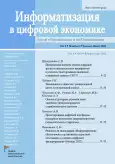Vol 4, No 1 (2023)
- Year: 2023
- Articles: 5
- URL: https://bakhtiniada.ru/2712-9306/issue/view/8695
Articles
Practical aspects of assessing the digital maturity of industrial companies in the context of piloting innovation in digital services of the State Industry Information System
Abstract
Currently, the problems of assessing the digital maturity of the lower level of the economy are the low involvement of leading digital industrial companies in the formation and updating of the methodology for assessing the level of digital maturity of industry business, as well as the lack of practical testing of the proposed changes in the questionnaire of the digital passport in the State Industry Information System. In order to overcome these challenges, ANO Digital Economy and the Ministry of Industry and Trade of the Russian Federation are piloting innovation in the digital passport module of the State Industry Information System. The article presents the results of a pilot project to test updated methodological recommendations for a digital passport of an industrial company: a system of three "wells", 27 directions and 123 subdirectories of assessment; the results of assessing digital maturity of eight leaders of industrial digitalization, as well as levels of digital maturity in the context of basic, auxiliary and technological processes. Additionally, the level of digital maturity in the direction of artificial intelligence is specified. Digital maturity and digital readiness should not be synonymized. Digital maturity is the target image of the result. Thus, digital readiness should be considered as a set of digital skills and knowledge of employees, their digital literacy, as well as trust in services implemented during digital transformation.FUNDING.The study was carried out with the financial support of the RFBR in the framework of scientific project No. 20-010-00942 A.
Informatization in the Digital Economy. 2023;4(1):9-22
 9-22
9-22


Objects' security: universal method of economic assessment
Abstract
A universal method of economic assessment of the objects' security of is proposed. The method is based on original algorithms for ranking the main threats, step-by-step clarification of the damage values from the violation of the object's security and assessment of the time, labour and financial resources spent on hacking protection. It is shown that there are no restrictions on the proposed method to assess the level of the objects' security for various purposes. FUNDING:The research was supported by the Russian Foundation for Basic Research under the scientific project No. 15-01-06324/15 "Modelling of production and management processes for rapid assessment and optimisation of resource intensity of goods and services: the formation of a universal methodological and instrumental support".
Informatization in the Digital Economy. 2023;4(1):23-36
 23-36
23-36


Evaluation of the solution to linear programming problems with approximate data in Lp-norms
Abstract
The article considers the conditionality of solving correct computational linear programming problems (LPP) given in canonical form with inaccurately known matrix elements and a data vector. The evaluation of the solution of linear programming problems is given in various Lp-norms.Estimates of the error in solving linear programming problems with an approximately given right-hand side and with an approximately given matrix of coefficients are given in the form of theorems. In the form of theorems, estimates of the relative error of the inverse perturbation matrix and the absolute and relative errors of the approximate solution of linear programming problems in the general case with approximately specified coefficients of the constraints' system are obtained. The implementation of the authors' statements in the form of a number of the above theorems makes it possible to effectively conduct research on business processes in the digital economy based on linear mathematical models and more reasonably obtain solutions to computational problems when working with approximate data.
Informatization in the Digital Economy. 2023;4(1):37-52
 37-52
37-52


Designing a digital platform to support knowledge-intensive microenterprises (RD start-ups)
Abstract
The author considers the digital platform or electronic business environment Maxwelland.ru designed to support the organizational, managerial and financial activities of knowledge-intensive microenterprises (startups) in research, engineering, technology and educational fields of activity. The digital platform provides its users with a set of IT services.Applying these services, subjects of the high-tech sphere can place business proposals and projects of scientific and technological progress in the Maxwelland.ru information space, exchange messages and documents with partners, save project documentation and publish the results of intellectual activity for further use.
Informatization in the Digital Economy. 2023;4(1):53-72
 53-72
53-72


Рецензия на монографию «Информационное обеспечение и продвижение туристкой дестинации в условиях цифровой трансформации» (Москва, 2022)
Informatization in the Digital Economy. 2023;4(1):73-75
 73-75
73-75










